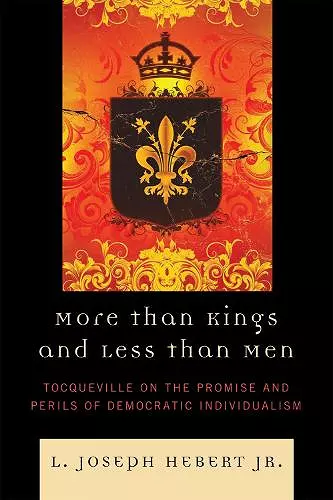More Than Kings and Less Than Men
Tocqueville on the Promise and Perils of Democratic Individualism
Format:Hardback
Publisher:Lexington Books
Published:25th Jan '10
Currently unavailable, and unfortunately no date known when it will be back

More than Kings and Less than Men: Tocqueville on the Promises and Perils of Democratic Induvidualism examines Alexis de Tocqueville's hopes and fears for modern democracy, arguing that the distinctive political philosophy informing Democracy in America can help us to think more profoundly about the problems facing liberal democratic society today. L. Joseph Hebert, Jr. argues that Tocqueville saw the historical power of democracy as originating in its promise to liberate human nature, and the greatness it is capable of achieving, from the artificial constraints of conventional hierarchy. He probes Tocqueville's fear that the momentum of democratic change may violate that promise by neglecting or even stifling human greatness in the name of an artificial equality of conditions. Hebert explains why Tocqueville saw the need for a "new political science" to regulate democracy, and why Tocqueville thought that the central task of this science, supported by enlightened statesmanship, was to combat "individualism," an extreme form of civic, moral, and intellectual apathy capable of ushering in a historically unprecedented form of despotism. Hebert looks in depth at the principles of Tocqueville's political science, their relation to classical, modern, and contemporary political thought, and their practical applications in his time and ours. He outlines the model Tocqueville recommended for a free and flourishing modern democratic order and analyzes the primary mechanisms Tocqueville proposed for avoiding the perils and securing the promise of democracy in his own day. Hebert observes that many of Tocqueville's fears regarding individualism are occurring today, and analyzes how Tocqueville's insights might be applied to combat individualism and promote genuine liberty in our own time.
More than Kings and Less than Men is an exceptionally well written, thoughtful, and erudite work. In highlighting the classical elements of Tocqueville's thought, Professor Hebert deepens our understanding of the great political philosopher and enhances his stature as the one, indispensable source for addressing the moral ills of contemporary American life. A most welcome and worthy addition to Tocqueville scholarship. -- Sandord Kessler, North Carolina State
Hebert shows us that the Tocqueville widely admired for his prescient insights into late-modern liberal democracy is also a philosopher of the first rank—who moderated classical and medieval views to devise a political science that encourages our strengths and corrects our failings. This elegant volume captures the spirit of Tocqueville's philosophy on liberty, religion, civic virtue, and leadership, making it indispensable for students of not only Tocqueville but also of liberal democratic theory and political theory generally. -- Paul Carrese, U.S. Air Force Academy
Countless studies that analyze Tocqueville's optimism and pessimism about the future of democracy are available. When authors turn to the dark side of Tocqueville's Democracy in America, they concentrate on the tyranny of majority and the individualism and materialism that is said to be democracy's challenge. While hardly abandoning these interpretations, Herbert offers a different focus. He is concerned with the loss of virtue and how it might be restored within a Tocquevillian context. To accomplish this task, the author argues that Tocqueville turns to a natural aristocracy. Hebert (St. Ambrose Univ.) recognizes the old aristocracy no longer carries purchase and becomes a moral and intellectual elite that is steeped in the classics and recognizes the importance of Socratic virtue. This will occur in a 'Christian liberal democracy' because, readers are told, Christianity is 'an indispensable foundation for the institutions of modern liberal democracy.' Here, the author states that 'the average citizen [is] susceptible to the guidance of learned authority.' The author finds a larger role for modern elites than is found in other scholarly interpretations of Tocqueville. Summing Up: Recommended. Graduate, research, and professional collections. * CHOICE, September 2010 *
Provocative yet always fair-minded, Hebert successfully demonstrates that Tocqueville's ideas remain an invaluable aid for thinking through some of the major predicaments of democracy in our own time. Hebert's stimulating analysis of Democracy in America does justice to the complexity and profundity of Tocqueville's thought. -- Brian Danoff, Miami University
ISBN: 9780739133743
Dimensions: 240mm x 162mm x 20mm
Weight: 494g
226 pages